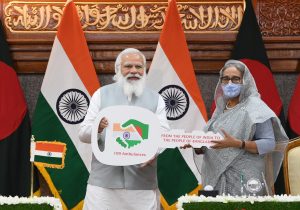India is keeping a close eye on the situation in neighboring Bangladesh, where violent unrest seeking the dismantling of quota-based reservations in government jobs has claimed more than 100 lives.
The unrest gathered momentum after a court ruling last month reinstated quotas in government jobs. Prime Minister Sheikh Hasina had abolished the quota, amounting to more than 50 percent of all government jobs, of which 30 percent were reserved for descendants of freedom fighters in the 1971 Bangladesh liberation war, in 2018. Students opposed the reinstatement of the quotas as they believed it favored allies of the governing Awami League party, which led the independence movement against Pakistan.
On July 21, the Bangladesh Supreme Court slashed the quota for descendants of the freedom fighters in government jobs from 30 percent to 5 percent. Although this has defused the crisis somewhat, the curfew remains in place and the issues underlying the unrest remain alive.
New Delhi, which has invested significantly in cultivating ties with its eastern neighbor for almost a decade and a half, has been publicly circumspect about the protests. Although India’s Ministry of External Affairs described the unrest as “an internal matter of Bangladesh,” it drew attention to the events’ importance to India. The Minister for External Affairs S Jaishankar was “himself monitoring the situation,” Randhir Jaiswal, the ministry’s spokesperson said.
So why is India worried about the developments in Bangladesh?
For one, India has always desired a peaceful periphery, which would leave it free to focus on its own economic development. India shares a 4,096-kilometer border with Bangladesh, and New Delhi is concerned that any unrest in Bangladesh could spill across into the Indian states of Assam, West Bengal, Mizoram, Meghalaya, and Tripura. These are already considered vulnerable as many of them have witnessed violent insurgencies.
With two borders – the one with Pakistan and the other with China – tense, India would like to ensure that its frontier with Bangladesh remains peaceful. New Delhi is already keeping a wary eye on the civil unrest in Myanmar and announced that it will be fencing its borders with the junta-ruled country, situated to the south of Bangladesh.
With reports of Islamist, anti-India and other elements joining the protests that largely started as a student-led initiative, New Delhi is apprehensive that the investment it has made in the past decade and a half in improving ties with the Hasina government and the people could be wiped out.
India has invested heavily in Bangladesh to build public support and goodwill. In 2015, India ratified a decades-old land boundary pact with Bangladesh, setting ties on a high growth trajectory. The two countries also resolved their maritime boundary dispute.
The two issues were impediments in scaling up ties. With New Delhi ratifying the land boundary pact and accepting a U.N. tribunal’s verdict on the maritime frontier, the stage was set for a quantum jump in bilateral relations.
In its bid to shore up ties with the Bangladeshi people and the Hasina government, New Delhi has so far extended almost $8 billion in Lines of Credit (LoC) to Dhaka. This is used for development projects – building infrastructure, construction of a pipeline to supply diesel – aimed at improving the lives of Bangladeshis even as it has deepened bilateral connectivity and economic cooperation.
Bangladesh currently is the largest recipient of India’s LoC assistance abroad. In fact, the two countries describe the present period of bilateral ties as “Sonali Adhyaay” – a “Golden Era” in relations.
A friendly Bangladesh is important for the realization of India’s plans to develop its far-flung and economically underdeveloped northeastern region. India has been pushing for greater economic integration of this region with Bangladesh as well as countries like Nepal and Bhutan. The plans include greater rail, road and energy connectivity within the Bangladesh-Bhutan-India and Nepal subregion.
Greater economic prosperity in India’s northeast would help the Indian government prevent the reigniting of insurgencies in the region.
Hasina has been particularly sensitive to India’s concerns on this count. One of her first moves toward India after being elected prime minister in 2008 was to hand over some key captured leaders of the outlawed United Liberation Front of Asom (ULFA) to New Delhi. The ULFA’s decision earlier this year to disband is seen as the result of Bangladesh denying them sanctuary on its soil.
The ULFA has been active since the late 1970s, seeking secession from India and a separate state for the Assamese people. The group had sought shelter in Bangladesh, using bases there to launch strikes against India. That Hasina did this on her own without any conditions or bargains did not go unnoticed in India. Indian officials have pointed out that this showed a sensitivity to India’s security concerns not exhibited by previous military or Bangladesh Nationalist Party governments.
The recent unrest has affected trade between India and Bangladesh, which is expected to hit the already ailing Bangladeshi economy hard.
Any weakening of the Hasina government – and strengthening of the opposition BNP and Islamist parties – is therefore bad news for India. The BNP and Islamist parties are seen as closer to Pakistan and China and hence inimical to Indian interests. Given its tense ties with China and Pakistan, New Delhi can ill afford to see their influence rise in Bangladesh.
India also sees Bangladesh as a critical part of its Indo-Pacific strategy and a vital link in its Act East policy.
And Hasina has been receptive and welcoming of India’s ideas on these issues. Little wonder then, that India has chosen to stand by Hasina whenever she faces a challenge.

































